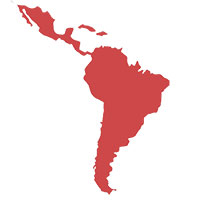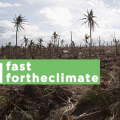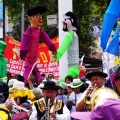Religions Unite For COP20
Yi Ying Teh | December 12, 2014.
More than 200 people gathered in the centre of Lima at an interfaith prayer service on Tuesday evening. From singing songs in Sanskrit to dance and multimedia, people from a wide spread of religions emanated hope and a strong desire for climate action in the plaza of the Basilica of San Francisco.
Since the climate talks in Durban, South Africa in 2011, the interfaith movement has been increasingly visible. Building on the ‘Fast for the Climate’ movement started by Yeb Saño, the Philippines’ lead negotiator at the 2013 UN climate talks,Pray and Fast for the Climate encourages people to follow suit by fasting on the first of every month and praying in their respective traditions. Their fast on 1st December coincided with the beginning of climate talks in Lima, Peru that seeks to lay the groundwork for the Paris agreement in 2015.
Leading up to the climate talks, the Our Voices campaign asked churches and faith communities to organise a vigil titled #LightForLIMA. On Sunday evening, more than 50 vigils took place in over 15 countries. Providing prayers from various faiths written by religious leaders such as a Du’a written by Imam Zaid Shakir and a prayer written the Archbishop Emeritus Desmond Tutu, the campaign encouraged these prayers to be used at the vigils. Executive director of GreenFaith Reverend Fletcher Harper, who was present at the prayer service, said: “The strength of religion is in ancient customs like the lighting of candles, being a light in the darkness. We teamed up with Solar-Aid to distribute solar lights worldwide, giving it a different twist.”
The active role of religions in climate action extends to organisations based in Peru. Earlier in the day before the prayer service, the Interfaith Council of Peru – Religions for Peace co-organised a conference ‘COP20 Perspectives from the South’. Among eight themes was eco-theology and the inter-religious dialogue to address environmental problems. Speaking to a packed room, religious leaders repeatedly articulated the need for human beings to renew their relationship with the environment.
Religious organisations from the Global South are also active at the climate talks. The Baha’i community, which has been conducting environmental education for children, is one of the many organisations that form the Religions for Peace group. Azam Sahih de Matin, president of the interfaith network of women of faith and spirituality in Peru says: “Religions are one of the first teachers of morality. We teach people to be conscious and to live just lifestyles. The founder of the Baha’I faith says that that the planet is one country and the human race is one family.”
Even organisations that have historically focused on specific environmental problems are jumping on board. The Asociación Boliviana Uniendo Manos por la Vida (UMAVIDA) or the Bolivian Association Joining Hands for Life, which is affiliated with the Presbyterian Church USA, has a traditional focus on the contamination from the Kori Kollo mines in Oruro, Bolivia. Yet, Chenoa Stock, facilitator at UMAVIDA said: “All of our work is under this context of climate change. It is an overarching issue that encompasses food, extractives and water issues.” José Miguel Mollo Flores, one of the youth from UMAVIDA at the prayer service also mentioned that evangelical churches in his town of Huanuni, Bolivia are increasingly praying for the earth to be healed and restored.
Religious communities around the world are heeding Archbishop Desmond Tutu’s call to kindle a “light for Lima” as they pray for the climate talks. Just yesterday, in a message to the COP presidency, Pope Francis warned that inaction could have very serious consequences for the planet and humanity and therefore, there is a clear ethical imperative to act. The question is, are countries listening?
Photo courtesy of Joseph Tobiason.













comment